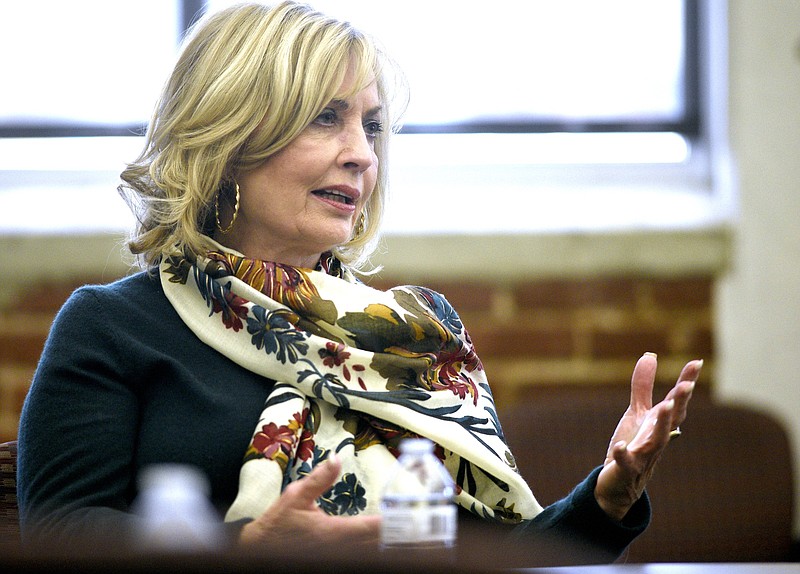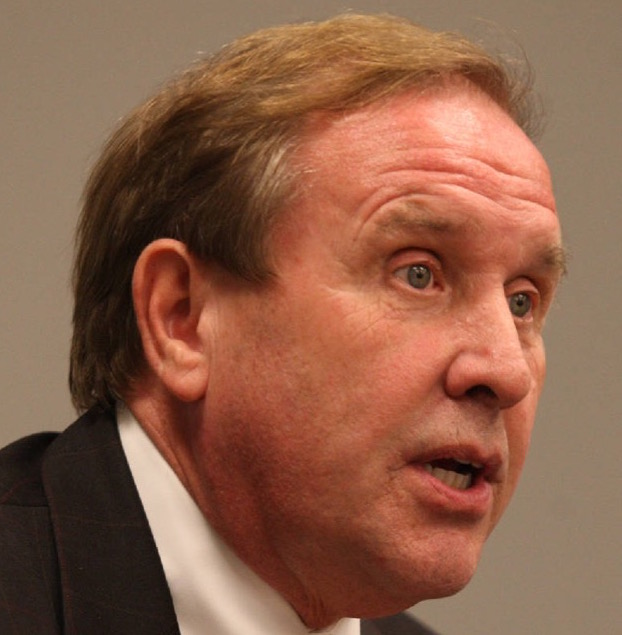NASHVILLE - With Tennessee government rolling in the dough with general budget surpluses now pegged at $750 million, two Hamilton County legislators have competing ideas on how to return some of the money to the public.
Both House Finance Vice Chair Patsy Hazlewood, R-Signal Mountain, and Rep. Mike Carter, R-Ooltewah, are focusing on doing that through grocery-food sales tax holidays.
Hazlewood last week formally introduced a bill to zero out the state's 4% portion of the sales tax on grocery food sales for all of June and July.
Meanwhile, Carter is working on legislation that would create a mechanism that returns not only much of this year's budget surplus to consumers in the form of lower food taxes but also does the same in future years when revenues gallop past state estimates.
Hazlewood said her bill "is an effort to put some money back in every Tennessean's pockets because we all eat," the lawmaker said. "I've chosen June and July because that's when kids are out of school. And we know that some kids get breakfast and lunch at school, [but] in the summers they don't. This will hopefully make sure that some children and families will be able to eat a little better in the summer."
She said the 4% proposal would cost the state about $100 million in revenue. It applies solely to the state share of the sales tax. The state portion also provides a split with local governments.
"They will still collect their tax, and we will still provide to them the amount of [normally] shared state sales tax they would have received and collected," Hazlewood said. "I don't want to hurt anyone else in this process."
Cities and counties also have local option sales taxes which under law can go up to 2.75%. That wouldn't be affected by her proposal.
Tennessee's Fiscal Year 2020 total budget is $39.1 billions, about $18.85 billion of which is from state funds.
At the end of Fiscal Year 2019 on June 30, state general revenues soared $580 million over original estimates. While lawmakers recognized $118 million of that, it still left a $461.3 million surplus.
Figures announced Tuesday by the Department of Finance show the general fund in just the first five months of the current fiscal year have smashed through budgeted estimates by $292.3 million. The combined figure for all of last year and the first part of this year is $753 million.
In terms of total budget collections, which include fuel taxes, Tennessee has exceeded original estimates in the last fiscal year and the current one combined by $987 million.
Carter proposal
Carter, a former Finance Committee member, has been working with Rep. Chris Hurt, R-Halls on a separate budget surplus bill that could reduce sales taxes for a period of months or throughout the year whenever there is a surplus.
"This bill will be the first bill where we've been able to return budget surpluses," Carter said. "In other words, the money taken from taxpayers, it'll be returned to them."
The plan, which Carter and Hurt are still working to finalize, says that going forward, if there is a surplus at the end of the state's June 30 fiscal year, officials will later determine in November or December exactly how much the surplus was and report that to lawmakers before they return for the annual session that begins in January.
Carter said the bill will "require that the first amount of that budget surplus goes to fund the Rainy Day Fund until it meets its statutory amount, which is 8% of Tennessee tax revenues."
Gov. Bill Lee in his first budget in 2019 did a "great job" and "made a huge contribution" to the Rainy Day emergency reserve fund, Carter noted, and it's around $1.1 billion.
"But we're still about a quarter billion dollars shy," he added. "The law says we will be 8% and we're not."
The Carter/Hurt bill would require that up to 25% of any surplus go into the emergency reserve each year until the 8% figure is reached.
Much of the rest would go toward reducing the state's 4% grocery food tax over a 12-month period, said Carter, who like Hazlewood will have provisions to protect state shared sales tax revenues with local governments.
With some lawmakers such as Senate Finance Committee Chairman Bo Watson, R-Hixson, eyeing use of some of the surplus for transportation, Carter and Hurt say they are open to considering including a separate fund of perhaps $50-$55 million annually over a period of years. It would go to the state's 95 county governments to pay for local road projects.
Using a $1 billion budget surplus figure as an example, Carter laid out how he believes the system should work with regard to how funds available to reduce food taxes would work.
An additional $100 million would first go into a new contingency fund outside the Rainy Day fund. It's intended as a failsafe so that the sales tax on groceries can still be cut in case state revenue falls short of projections.
"If we don't calculate correctly and we miss it by $10 million or $41 million, we must have a contingency fund there to make up that balance," Carter said. "It'll stay at $100 million. If we use $9 million of it the first year, the next year the first 25% would still go into the Rainy Day Fund. Next, we wouldn't put $100 million in the [new contingency] fund, we'd put $9 million in the fund."
Carter emphasized "this is the start of the bill and not the finish," but he also stressed local governments "would be held harmless" and not see their revenues drop as a result of food tax reductions.
All the discussions about food tax reductions come as Tennessee government experiences yet another massive budget - the Department of Finance prefers the term "over collections."
It's the result, in part, of an economy that continues to grow. But another more Tennessee-specific factor stems from consistent low-ball revenue estimates by the State Funding Board.
Contact Andy Sher at asher@timesfreepress.com or 615-255-0550. Follow him on Twitter @AndySher1.

